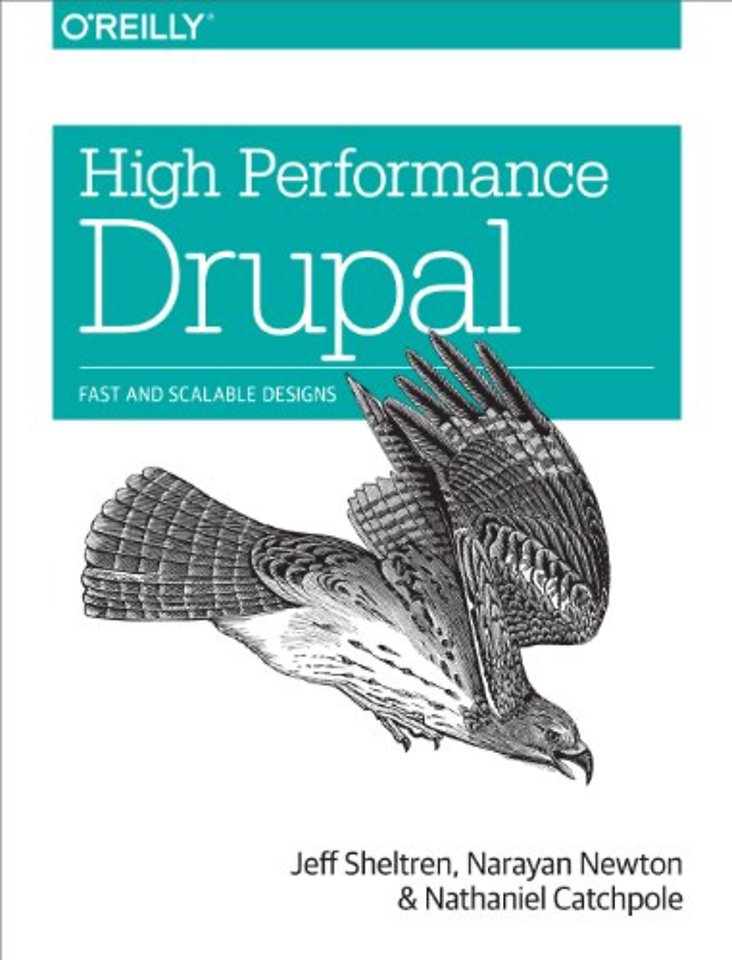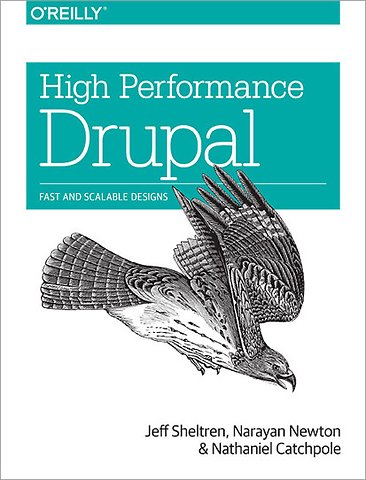


Jeff Sheltren has been involved with open source for over eleven years. He started using Linux professionally at the University of California at Santa Barbara, where he was a Senior Systems Administrator and Programmer for the Computer Science department.
Meer over de auteursHigh Performance Drupal
Fast and Scalable Design
Samenvatting
How can you help your Drupal website continue to perform at the highest level as it grows to meet demand? This comprehensive guide provides best practices, examples, and in-depth explanations for solving several performance and scalability issues. You'll learn how to apply coding and infrastructure techniques to Drupal internals, application performance, databases, web servers, and performance analysis.
Covering Drupal versions 7 and 8, this book is the ideal reference for everything from site deployment to implementing specific technologies such as Varnish, memcache, or Solr. If you have a basic understanding of Drupal and the Linux-Apache-MySQL-PHP (LAMP) stack, you're ready to get started.
- Establish a performance baseline and define goals for improvement
- Optimize your website's code and front-end performance
- Get best and worst practices for customizing Drupal core functionality
- Apply infrastructure design techniques to launch or expand a site
- Use tools to configure, monitor, and optimize MySQL performance
- Employ alternative storage and backend search options as your site grows
- Tune your web servers through httpd and PHP configuration
- Monitor services and perform load tests to catch problems before they become critical
Specificaties
Over Dave Newton
Inhoudsopgave
-Getting Started with Performance Improvements
-Establishing a Performance Baseline
-Setting Goals for Website Performance
-The Many Aspects of Drupal Performance
-Creating a Prioritized List of Improvements
2. Frontend Performance
-Limiting HTTP Requests
-Image Requests
-Minification
-Compression
-Cacheable Headers
-CDNs
-Keep Third-Party Libraries Up to Date
-External Scripts
-Single Points of Failure (SPOFs)
3. Drupal Performance Out of the Box
-Page Caching
-When Should You Use Page Caching?
-CSS and JavaScript Aggregation
-Logging
-The Cache and Other Swappable Storage
-Cron
-Views
4. Drupal Coding for Optimal Performance
-Context Matters
-False Optimizations
-Listing Entities
-Caching
-Queues and Workers
-Cache Stampedes and Race Conditions
5. Drupal Coding for Abysmal Performance
-variable_set() Abuse
-External Requests
-Sessions
-Excessive Cache Granularity
-PHP Errors
-Debug Code in the Code Base
-Development Settings
6. Verifying Changes
-Analyzing Frontend Performance
-Analyzing Application Performance
7. Infrastructure Design and Planning
-Horizontal and Vertical Scaling
-Service Categorization
-Working Well Together
-Example Two-Layer Configuration
-Example Larger-Scale Infrastructure
-Development and Staging Environments
-Internal Network Layout
-Utility Servers
-High Availability and Failover
-Hosting Considerations
-Summary
8. Service Monitoring
-The Importance of Monitoring Services
-Monitoring Alerts with Icinga
-Graphing Monitoring Data
-Internal Versus Remote Monitoring
9. "DevOps": Breaking Down Barriers Between Development and Operations
-Revision Control Systems
-Configuration Management Systems
-Pulling It Together: In-Depth Example with Puppet and Git
-Development Virtual Machines
-Deployment Workflow
-Deployment with Jenkins CI
10. File Storage for Multiple Web Servers
-rsync
-GlusterFS
-Single NFS Server
-HA NFS Cluster
-Storage Area Networks (SANs)
11. Drupal and Cloud Deployments
-What Is the Cloud?
-Why Use the Cloud?
-Infrastructure Overhead
-Prepackaged Clouds
-Common Issues with Cloud Deployments and Their Mitigations
12. Failover Configuration
-IP Failover Versus DNS Failover
-Service-Level Issues
-Heartbeat
13. MySQL
-Drupal and MySQL Engines
-Versions of MySQL
-General Configuration
-Replication
-Virtualized Deployments
14. Tools for Managing and Monitoring MySQL
-Percona Toolkit
-Openark Kit
-mysqlreport
-Percona Monitoring Plug-Ins
15. MySQL Query Optimization
-Index Basics
-Base Tables and Join Order
-Common Issues
16. Alternative Storage and Cache Backends
-Cache, Lock, and Session Storage
-Memcache In Depth
-How to Break Your Site with Memcache
-Entity/Field Storage
17. Solr Search
-Performance and Scalability Considerations
-Integrating Solr with Drupal
-Solr Configuration
-Indexing Content
-Infrastructure Considerations
-Solr Replication
-Drupal Module Installation
18. PHP and httpd Configuration
-APC: PHP Opcode Cache
-php.ini Settings
-PHP Apache Module Versus CGI
-Apache MPM Settings
-Prefork Thread Settings
-KeepAlive
-Cache Headers
-Logging
-Server Signature
-Administrative Directory or VirtualHost
-Nginx
19. Reverse Proxies and Content Delivery Networks
-Using a Reverse Proxy with Drupal
-Understanding Varnish Configuration Language
-Cookies and Varnish
-Caching for Authenticated Users
-Edge-Side Includes
-Serving Expired Content
-Error Pages
-Memory Allocation
-Logging and Monitoring Varnish
-Sample VCL for Drupal
-Content Delivery Networks
20. Load Testing
-Different Types of Load Tests
-Creating a Valid Test
-When to Test
-Interpreting Test Results
-Server Monitoring During Load Tests
-Where to Test
-Example Load Test Using JMeter
21. Where to Next?
-Official Book Website
-High Performance Drupal Group
-Drupal Watchdog
-Revision Control with Git
-Varnish
-Configuration Management
-Vagrant
-Jenkins
-MySQL Performance
-InnoDB Index Structures
Index
Anderen die dit boek kochten, kochten ook
Net verschenen
Rubrieken
- aanbestedingsrecht
- aansprakelijkheids- en verzekeringsrecht
- accountancy
- algemeen juridisch
- arbeidsrecht
- bank- en effectenrecht
- bestuursrecht
- bouwrecht
- burgerlijk recht en procesrecht
- europees-internationaal recht
- fiscaal recht
- gezondheidsrecht
- insolventierecht
- intellectuele eigendom en ict-recht
- management
- mens en maatschappij
- milieu- en omgevingsrecht
- notarieel recht
- ondernemingsrecht
- pensioenrecht
- personen- en familierecht
- sociale zekerheidsrecht
- staatsrecht
- strafrecht en criminologie
- vastgoed- en huurrecht
- vreemdelingenrecht





